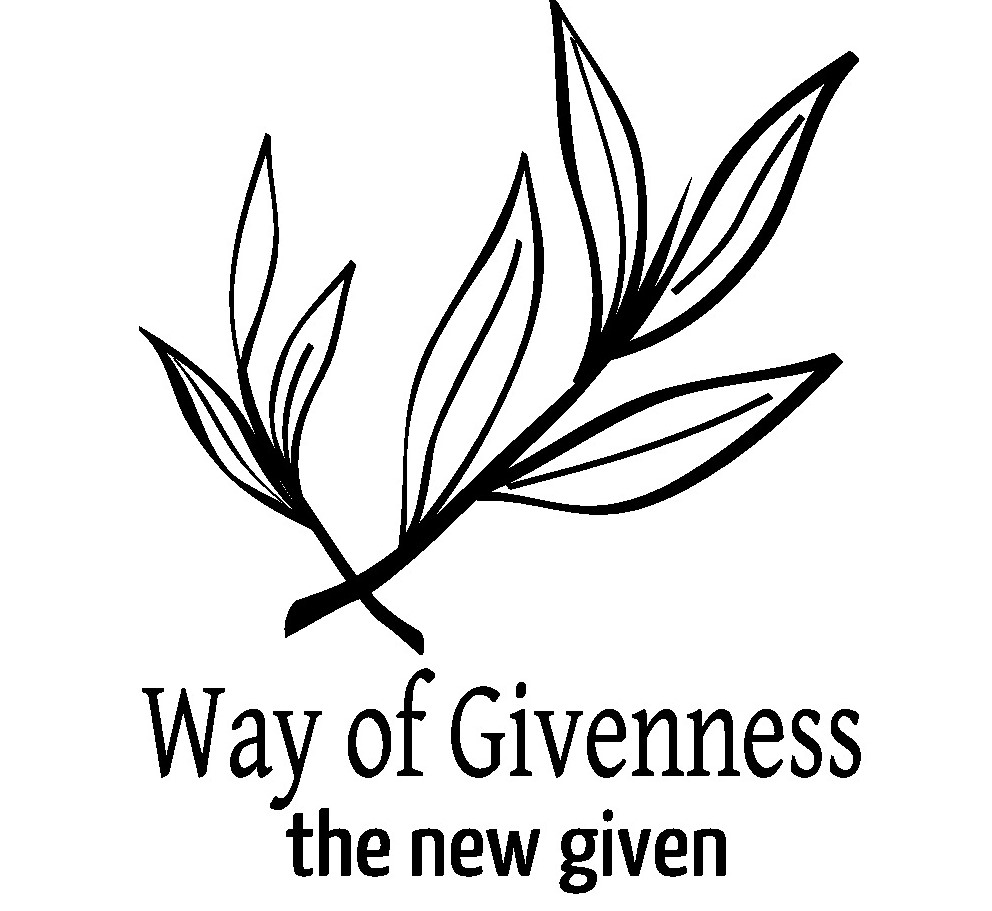- Home
- Daily Meditation
Culture and Stability
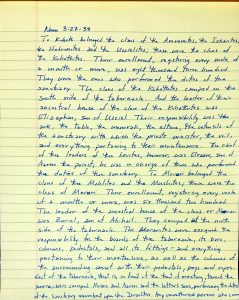
Num 3:27-38
Num 3:27-38 10/15/2017
My family has a culture. Like most families, it’s complex. Some of it is beautiful. Some of it is manipulative. Some of it involves shouting.
But the culture is stabilizing. Even when we breakdown (meltdown) in a moment of complete dysfunction – our culture informs our expectations and stabilizes our behavior.
You have control over this. You can change your culture. Of course, it’s not a fiat kind of control. You can’t snap you fingers and manifest a change in culture.
But you can engage the other members of your family, or community, or if you prefer; your family-community. You can have some transparent conversations about values, and practices and relationships. You can explore what God might be speaking into your situation or through your situation with the people around you.
This is work. Someone has to lead in this effort.
For the children of Israel, it was the Levites. All eyes were on the Levites.
Who’s the Levite in your community – in your family? Who will lead the formation of culture?
Make the commitment. Start the conversation.
“He will purify the sons of Levi” Malachi 3:3
Levite Work
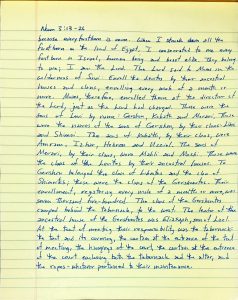
Num 3:13-26
Num 3:13-26 10/14/2017
The Levites might be thought of as the first professionals amongst the children of Israel.
Culture.
It comes from the part of community that doesn’t involve subsistence. Such people are removed from the daily pressure of assuring enough food to eat, enough shelter to protect.
With this, a freedom to serve – a freedom to create a different kind of value.
Mediation in the relationship between the community and God affords this freedom to serve and grounds the culture in the knowledge of God.
Mediators, like priests, dwell in the boundary between the ordinary and the divine – between what is eternal and what is utterly transient and invariably dynamic. Curiously, it is out of this boundary between the eternal and the changeable that flows music and literature and art and scientific knowledge.
The real possibility of our lives is somehow here. In the heritage of a God-aware culture that is so rich that it drives us to use our lives – to contribute our part- to this extraordinary flourishing.
Excellence is the watchword. Whatever you do today – make the commitment to do it with excellence.
Priests and Levites
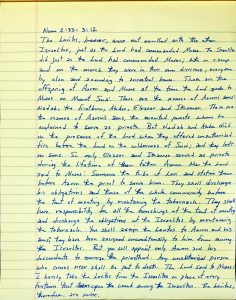
Num 2:33-3:12
Num 2:33-3:12 10/13/2017
“The Levites are Mine”, God says.
Ministry service to the Lord is a calling. God called the Levites to serve with the priests in the temple ministry.
Americans are somewhat renown as do-it-yourselfers. DIY – go to the local lumber; hardware; lawn care; paint; flooring; home appliance, superstore and you can do most anything.
Even though God described the entire Israelite community as a “nation of kings and priests”, DIY democratization wasn’t really the idea.
The Levites and the priests were given no land – no inheritance amongst the tribes. No other work to do. They were called to absolute specialization.
Aaron and his two surviving sons were responsible for the sacrificial worship of more than 600,000 men. It was a full-time job. More than a typical, modern, full-time job. The Levites only work was to assist the priests.
We have all been called to something – to create extraordinary value doing some, specific work. Encourage others to do the same. Trade with likeminded people who are committed to excellence.
Do that.
ora et labora
“Do you see those skilled at their work? They will stand in the presence of kings, but not in the presence of the obscure” Prov 22:29
Remembering the Camp
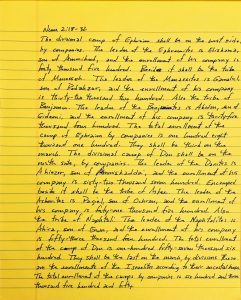
Num 2:18-32
Num 2:18-32 10/12/2017
The entire nation of Israel was encamped together.
As I write this Sukkot, the Feast of Booths, is coming to its annual close.
It is interesting that the feast was instituted before the children of Israel roamed for forty years. In fact, the intended plan was that this “living in temporary booths” arrangement should only last a short time.
But then came the failure to enter into the land – to believe and trust God. Though the children of Israel had been made numerous and powerful, and even despite that they daily experienced the remarkable and miraculous power of God’s presence dwelling with them, they feared.
Their fear kept them from God’s best.
Booths… Temporary dwellings… God’s faithfulness in taking them out of Egypt… Forty years of wandering. The good and the unfortunate are bound together in memory.
As a community, the children of Israel mark this occasion even today. A reminder of what was and what could have been.
What are we doing here?
I am afraid…But I also want God’s best.
Will the memory empower me?
“He who began a good work in you will be faithful to complete it” Phil 1:6
Order of the March
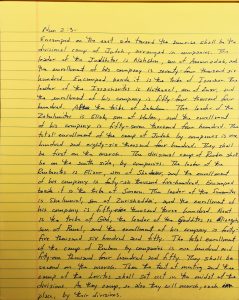
Num 2:3-17
Num 2:3-17 10/11/2017
The Israelites were arranged in a specific order around the tabernacle according to their tribes.
The arrangement wasn’t arbitrary; it was symbolic and practical.
The ordering of the calendar around feast days. The ordering of the day around the prayers and sacrifices. The geometric ordering of the camp with the tabernacle in the center. Everything was ordered around the presence of God in the lives of His people. This was a part of their power and identity.
These days, our lives are neither as pedestrian nor as stable as the Israelites. There is no camp. There is no city center with a church court in the middle. We race from one thing to another in our cars. We race even farther and faster on the internet.
The technology isn’t bad. But the stability and regularity that was once integrated into human experience, now requires us to make an effort.
So what if you slowed down just a bit? What if you chose to reorder you day? What might change?
Think about your perfect day. If things were entirely in your power, what would you include and what would you exclude? Morning meditation? Community meal? Mass? Office of Hours? Family prayer? Pilgrimage?
You’re doing life. What do you want to do differently?
How might you live?
Self-Realization
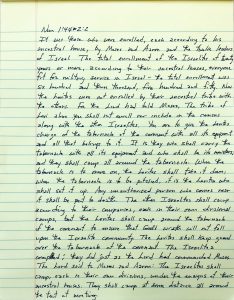
Num 1:44-2:2
Num 1:44-2:2 10/10/2017
The fledgling Israelite nation has 603,550 men who are ready for military service.
Like a college commencement or a boot camp completion ceremony, the census has the effect of creating awareness within the Israelite community of just how powerful they potentially were.
Whether an ancient or even a modern army; 600,000 men is a sober thing. The sheer numbers are formidable. Numbers like these require any potential adversary to take seriously the possibility of conflict.
There is in this a sudden realization that you are potentially much stronger than you had consciously realized.
Think about your faith community. Look around at the families with whom you worship.
Your community is stronger more capable than they realize.
Downstream
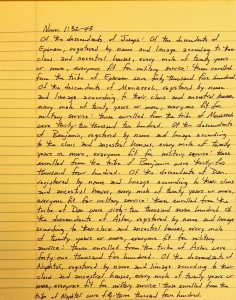
Num 1:32-43
Num 1:31-43 10/9/2017
The man Joseph has now become 72,700 men capable of military service. It took 400 years.
What will the impact of your life be in 400 years?
Right, I get it. It’s kind of an unfair question. There’s so much you don’t have control of – you will never have control of.
On the other hand, your life undeniably has impact. Whether you perceive it or not, in 400 years there are human beings who will exist, or not exist; who will share identity; who will affect their community, because of decisions that you are making today.
Telos. The idea of something satisfying its purpose.
A part of your purpose is bound in what comes after you; fostering and engendering what comes after you. Creating the space and possibility of what wants to come after you.
Perhaps it is right to say that you can’t live today worried about the impact of your decisions on people four centuries into the future.
Still, you have to admit, there’s a nagging legitimacy to asking the question.
What if you have far more power than you think?
I don’t want this to be a burden but you have to know something:
You have far more power than you think.
Census Results
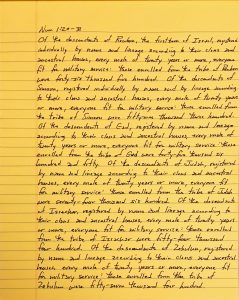
Num 1:20-31
Num 1:20-31 10/7/2017
Each man registered individually by name and lineage.
Today, I’m supposed to be taking my children to the old rural churchyard where five generations of my ancestors are buried.
I descended on my father’s side from a line that left Germany in the late 18th century. The line in America began with Anabaptist preachers, multiple generations of which had more than a dozen children. Those who survived childhood had the habit of living remarkably long lives.
In our time, it’s easy to think that your ancestors don’t matter very much. But the truth is, they matter more than we think.
The ancient Greeks were fond of saying, “Know Thyself”. As a matter of experience, I find this challenging advice without some recourse to where I’ve come from.
My parents have affected my life. And their lives by their parents, and so on. The residue is there whether or not we’re inclined to believe.
For the ancients, knowing where you came from was tantamount to knowing who you were.
Jesus liked to use the idea of engrafting to describe our adoption into a new lineage – with the full idea of our adoptive lineage having the impact of our natural lineage.
You are a child of Abraham. Think about what that means.
Now, go out and make your fathers proud.
Census
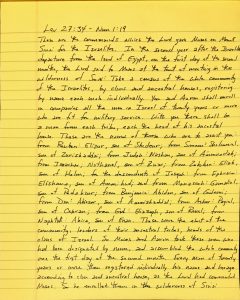
Lev 27:34-Num 1:19
Lev 27:34-Num 1:19 10/6/2017
Each man capable of military service is registered individually.
Everyone who is capable needs to make their abilities available to the community for the good of the community.
It is so easy to get caught up in the idea that my gifts and talents are mine exclusively – that I don’t need to share them. But the idea of authentic community is based on the common relationship of many individual people with God. So our individual responsibility is that we share one with another because of our common experience of God.
Responsibility.
To be a part of this community means the willingness and determination to build up the community. This is non-optional.
There is no actual, saving relationship with God that is indifferent to His community.
What you have to offer is unique to you. Only you could give it.
Which means that you must give it; not out of a sense of duty or obligation – even though this sensibility is valid.
You must give it because your gifts and talents are your unique expression of love for others – it is in this that you have the hope of fulfillment and the satisfaction of your potential.
Today, find a moment to embrace this possibility as you serve your brother.
The Tithe
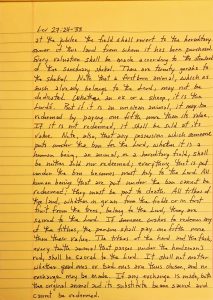
Lev 27:24-33
Lev 27:24-33 10/5/2017
A tenth of the increase belongs to the Lord.
The tithe is beside the sacrifices – meaning it’s in addition to sacrifice.
We invest in things we consider valuable, especially those things that bring a return on investment.
Value is recognized viscerally. We experience value in our feelings – in our affections.
Affections, as responses to value, move us through emotion to action.
Tithing is the original pay-it-forward model. When you finally get over your fear and realize what’s happening, your affection will begin to match your actions.
If there is a moral obligation to love others, then tithing is the first point action.
“Where you treasure is, there your heart will also be.”
